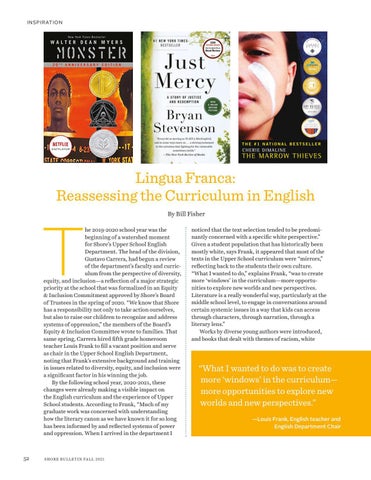I N S PIRATIO N
Lingua Franca: Reassessing the Curriculum in English
T
By Bill Fisher
he 2019-2020 school year was the beginning of a watershed moment for Shore’s Upper School English Department. The head of the division, Gustavo Carrera, had begun a review of the department’s faculty and curriculum from the perspective of diversity, equity, and inclusion—a reflection of a major strategic priority at the school that was formalized in an Equity & Inclusion Commitment approved by Shore’s Board of Trustees in the spring of 2020. “We know that Shore has a responsibility not only to take action ourselves, but also to raise our children to recognize and address systems of oppression,” the members of the Board’s Equity & Inclusion Committee wrote to families. That same spring, Carrera hired fifth grade homeroom teacher Louis Frank to fill a vacant position and serve as chair in the Upper School English Department, noting that Frank’s extensive background and training in issues related to diversity, equity, and inclusion were a significant factor in his winning the job. By the following school year, 2020-2021, these changes were already making a visible impact on the English curriculum and the experience of Upper School students. According to Frank, “Much of my graduate work was concerned with understanding how the literary canon as we have known it for so long has been informed by and reflected systems of power and oppression. When I arrived in the department I
52
SHORE BU LLET IN FA LL 2021
noticed that the text selection tended to be predominantly concerned with a specific white perspective.” Given a student population that has historically been mostly white, says Frank, it appeared that most of the texts in the Upper School curriculum were “mirrors,” reflecting back to the students their own culture. “What I wanted to do,” explains Frank, “was to create more ‘windows’ in the curriculum—more opportunities to explore new worlds and new perspectives. Literature is a really wonderful way, particularly at the middle school level, to engage in conversations around certain systemic issues in a way that kids can access through characters, through narration, through a literary lens.” Works by diverse young authors were introduced, and books that dealt with themes of racism, white
“What I wanted to do was to create more ‘windows’ in the curriculum— more opportunities to explore new worlds and new perspectives.” —Louis Frank, English teacher and English Department Chair


















